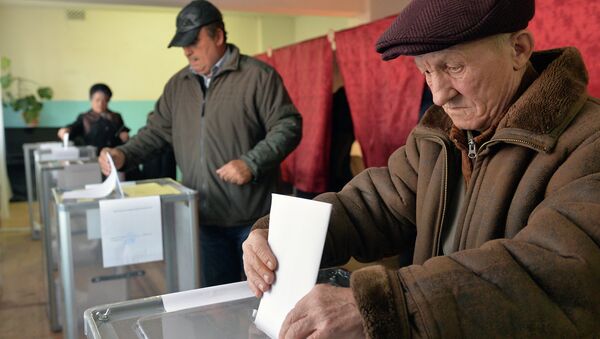LONDON, November 10 (Sputnik) — The response in Ukraine and in the West to the elections that occurred in the regions of eastern Ukraine on November 2, 2014, has been borderline hysterical. The elections have been called “undemocratic”, “illegal” and “illegitimate”. The US and the EU have solemnly said they will “not recognise them”.
Moreover, the elections have been condemned as breaching the terms of the Minsk Protocol and “threatening” the ceasefire.
This is all wrong. As was the case with the referendum held on May 11, 2014, there is no doubt that the elections for all their claimed imperfections are a valid reflection of the opinions of a substantial majority of the people in the regions in which they were held.
More to the point, it is not the elections that threaten the ceasefire. It is Ukraine’s hysterical reaction to them.
What this reaction shows is that Ukraine’s political leadership has no intention of entering into meaningful negotiations with the eastern regions. The peace process is deadlocked. It is Ukraine’s leaders, not the independence supporters, who are breaching the Minsk Protocol and who are putting the ceasefire at risk.
On the specific question of whether the November 2, 2014, elections breach the Minsk Protocol, the answer is very simple: they don’t.
I discussed the Minsk Protocol at length in an analysis I did some time ago.The Minsk Protocol was never intended to be a final agreement, or settlement of the conflict. It is not a treaty or a contract. It is a technical document produced, as its preamble makes clear, not as a result of negotiations between the Ukrainian government and the independence supporters, but by a Contact Group consisting of Russia, Ukraine and the OSCE that was set up to implement the “Peace Plan” Poroshenko announced back in June.
The independence supporters are not members of the Contact Group that produced the Protocol and have never accepted Poroshenko’s “Peace Plan”. They made that clear again immediately after their representatives, Zakharchenko and Plotnitsky, signed the Protocol. Zakharchenko and Plotnitsky signed the Protocol not because they agreed to Poroshenko’s “Peace Plan”, which the Protocol modifies, but rather because they were invited to do so by the Contact Group, which produced the Protocol, in order to confirm their agreement to the bilateral ceasefire that the Protocol mentions in its first article.
The provisions in the Protocol that call for a decentralization of power and elections in the southeastern regions in accordance with a law on special status, which the elections of November 2, 2014, are said to breach, are modifications of Poroshenko’s “Peace Plan”, which were agreed by Ukraine, and which the independence supporters, since they do not accept Poroshenko’s “Peace Plan”, neither agreed to, nor are bound by.
Nothing in the Protocol therefore prohibits the southeastern regions to hold elections in the territories they control and they have not breached the Protocol by holding them.
The Protocol does however commit Ukraine to undertake “an inclusive national dialogue” (article 7), which clearly refers to a commitment Ukraine made in the Four Power Statement issued in Geneva on April 17, 2014, which reads: “the announced constitutional process will be inclusive, transparent and accountable. It will include the immediate establishment of a broad national dialogue, with outreach to all of Ukraine’s regions and political constituencies, and allow for the consideration of public comments and proposed amendments”.
“An inclusive national dialogue” cannot happen unless “all of Ukraine’s regions and political constituencies” are represented by their freely chosen representatives. By the elections of November 2, 2014, the Donbas regions elected their leaders and representatives, who are Zakharchenko and Plotnitsky. However, instead of entering into a dialogue with them, as the Geneva Statement and the Minsk Protocol require them to do, the political leaders of Ukraine threw a tantrum, denounced the elections and cancelled the law on special status they committed themselves to in the Minsk Protocol.
This repeats the same pattern of self-destructive “all-or-nothing” behavior Ukraine has seen since the start of the Maidan protests a year ago. Though it was the Maidan leaders who first brought up the subject of constitutional changes when they thought this would help them get rid of Yanukovych, since they seized power in February, they have resisted all attempts to discuss them. Commitments made on February 21, April 17, and September 5, 2014, for inclusive talks have all gone by the board. No talks have been held, nor are they likely to be any time soon given the hysterical reaction to Zakharchenko’s and Plotnitsky’s election.
In the meantime, not surprisingly, the security situation is deteriorating. Since the only “talks” Ukraine’s leaders are prepared to consider are those they conduct with themselves, it is not difficult to see why.


